Top 10 Best Manufacturing CRM Picks to Boost Productivity in 2026
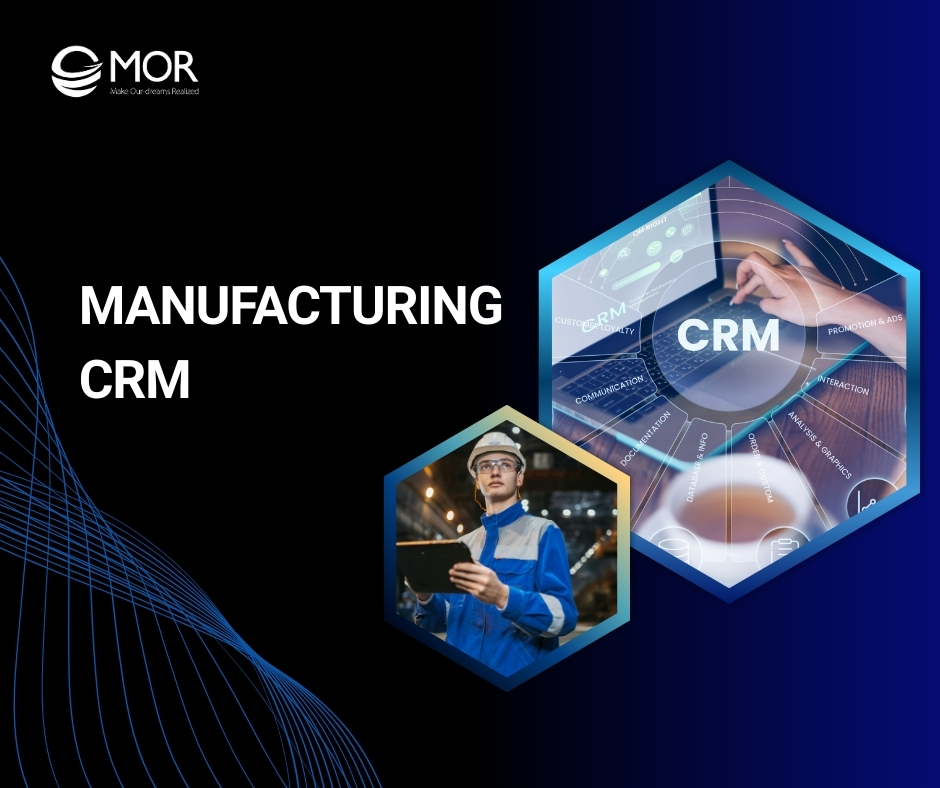
Manufacturers often struggle with scattered data and delayed orders. A manufacturing CRM helps align sales and production for smoother results. In this guide, MOR Software reviews the best options for 2026.
What Is Manufacturing CRM Software?
Manufacturing CRM software is built to help manufacturers manage sales pipelines and customer relationships in a structured way. It’s widely used by sales teams, production coordinators, and service staff in an equipment manufacturer CRM to improve communication, simplify daily tasks, and support long-term client satisfaction.
Recent research with more than 800 manufacturing leaders found that 85% say they must modernize day to day operations to stay competitive. This is one reason CRM programs are drawing more attention.
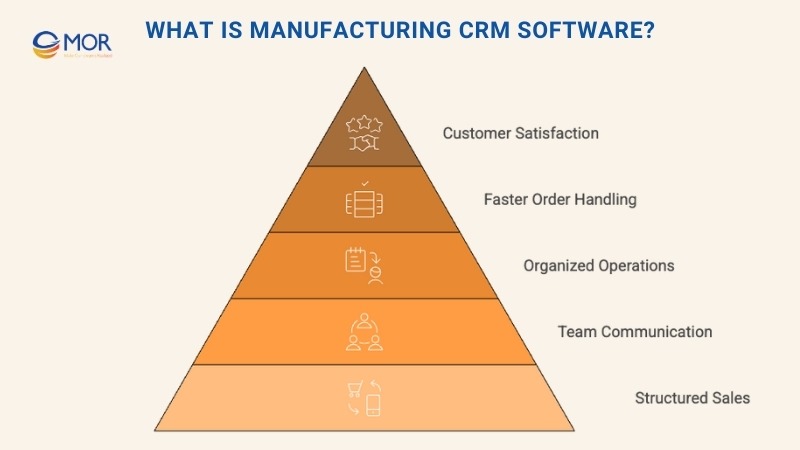
With tools for handling production schedules, tracking inventory, and managing orders, a manufacturing CRM keeps processes organized and responsive. These functions create stronger customer ties and allow manufacturers to run operations with greater speed and clarity. Independent analysis also shows CRM continues to return solid value, with an average of 3.10 dollars for each dollar invested.
Key Benefits of Manufacturing CRM Software
Adopting a manufacturing CRM brings clear advantages to both your business and your teams. These core uses of customer relationship management drive faster cycles and better service. Below are some of the most valuable gains you can expect:
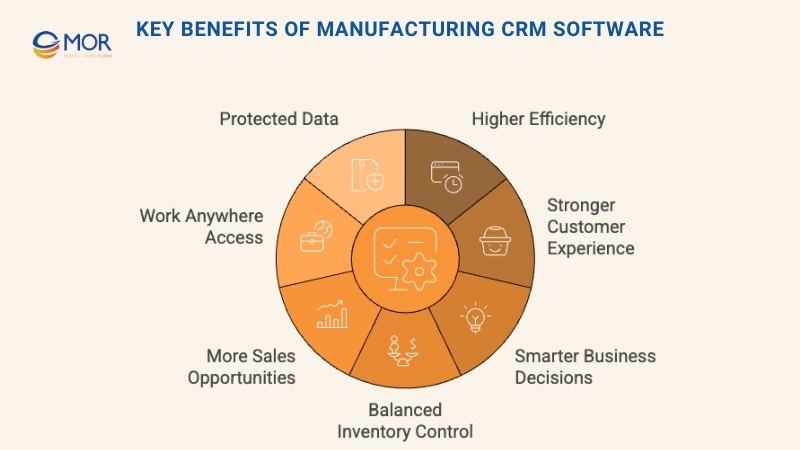
- Higher Efficiency: Automated processes cut down on manual work, freeing teams to focus on critical priorities. McKinsey estimates that more than 30% of sales related activities can be automated with current technologies.
- Stronger Customer Experience: Built-in order tracking and lead tools support quick updates and reliable service.
- Smarter Business Decisions: Reporting dashboards and analytics highlight performance trends for better planning.
- Balanced Inventory Control: Real-time stock monitoring helps avoid shortages and oversupply that disrupt production.
- More Sales Opportunities: Lead management tools highlight and organize prospects, improving conversion chances.
- Work Anywhere Access: Mobile-ready platforms let staff manage customer and sales data without being tied to a desk.
- Protected Data: Security functions safeguard sensitive details, building trust with customers and keeping information safe. According to IBM’s 2024 report, the average global cost of a data breach reached 4.88 million dollars.
Top Manufacturing CRM Software Reviews
We’ve gathered detailed reviews of the top manufacturing CRM platforms worth considering in 2026. Each of 10 best CRM software reviews highlights features, pros and cons, integrations, and best-fit use cases so you can decide which solution aligns with your needs.
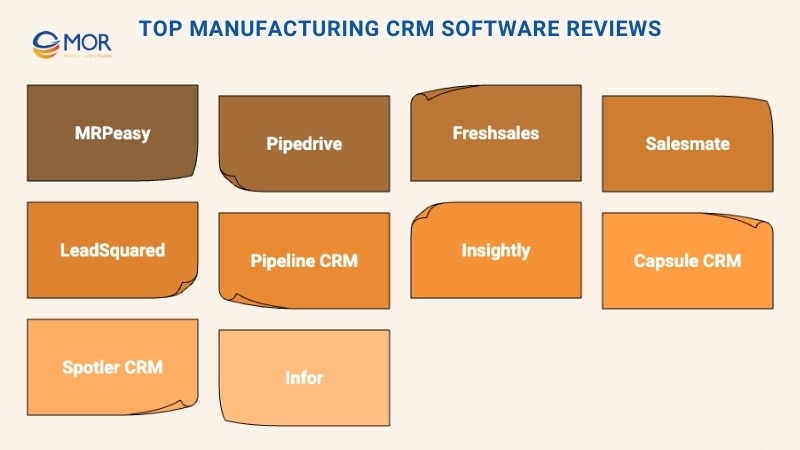
MRPeasy – Best for Tracking Customer Orders
MRPeasy is a cloud-based CRM for manufacturing industry players, built to streamline production and sales operations. It combines sales, production scheduling, procurement, inventory, and accounting into one easy-to-use system.
Why MRPeasy is a top choice
This manufacturing CRM connects customer orders with production planning in real time. Once an order is confirmed, you can reserve stock, generate new production jobs for missing parts, and raise purchase orders for required materials. Automatic scheduling based on order deadlines or resource capacity helps eliminate bottlenecks and ensures customers get their deliveries on time.
Standout features & integrations
Features include end-to-end sales and pricing management, from quote to delivery. Businesses can apply custom price lists, discounts, or markups with ease. Real-time shop floor reporting also lets workers track and update tasks from desktops or mobile devices, supporting smoother workflows.
Integrations include Amazon, BigCommerce, EDI, HubSpot, Magento, Pipedrive, QuickBooks Online, Salesforce, ShipStation, Shopify, Ware2Go, and WooCommerce.
Pros and Cons
Pros:
- Automates purchasing through quick PO generation
- Offers a clear order pipeline for visibility
- Simplifies cost and lead time estimation
Cons:
- Mobile app lacks some of the desktop features
- Setup can take time for new users
Plans and Ratings Overview
- 30-day free trial
- From $49/user/month
- Rating: 4.3/5
Pipedrive CRM – Best for Sales Pipeline Automation
Pipedrive is a sales-driven manufacturing CRM solution built to help teams capture leads, monitor deals, and cut down on repetitive admin work.
Why Pipedrive stands out
For CRM for manufacturing companies, Pipedrive’s deal and contact management tools are especially useful. You can track supplier, distributor, and client interactions in one dashboard. Its product catalog gives teams fast access to inventory and pricing while discussing terms, making negotiations more efficient. Automated pipelines can be customized to match your manufacturing workflow, aligning production schedules and order management with ongoing sales activity.
Standout features & integrations
Features include strong automation to minimize manual input. Custom triggers can send follow-up emails, schedule reminders, or prompt outreach to new leads. The built-in reporting suite provides visibility into sales performance and helps pinpoint pipeline bottlenecks. A scheduling tool also makes booking supplier or client meetings fast and straightforward.
Integrations include Surfe, Apollo.io, Microsoft Teams, Slack, Mailchimp, Google Meet, PandaDoc, DocuSign, QuickBooks, Stripe, Asana, Trello, OneClick, and CloudTalk.
Pros and Cons
Pros:
- Automates repetitive sales and admin tasks
- Flexible, customizable pipeline stages
- Drag-and-drop interface for ease of use
Cons:
- Some advanced tools require higher-cost plans
- Not built for highly complex manufacturing requirements
Plans and Ratings Overview
- 14-day free trial
- From $14/user/month (annual billing)
- Rating: 4.3/5
Freshsales – Best for Small and Medium Manufacturers
Freshsales is a customer relationship management platform tailored for small and mid-sized teams. It helps streamline sales activity with built-in automation, centralized contact management, and simple workflows that keep daily operations on track.
Why Freshsales is a good pick
For businesses looking for the best CRM for manufacturing business, Freshsales offers an intuitive pipeline view that makes tracking deals straightforward. Its lead scoring tool highlights the most promising prospects, allowing teams to focus on opportunities with the highest chance of success. On top of that, built-in calling and email functions keep all communication organized within one platform.
Standout features & integrations
Features include a visual deal pipeline for clear tracking, automated lead scoring to prioritize prospects, and native phone and email tools that reduce the need for external systems. These functions give sales teams everything they need in one place.
Integrations include Mailchimp, Zapier, QuickBooks, Google Workspace, Slack, HubSpot, Xero, Microsoft Outlook, Dropbox, and Trello.
Pros and Cons
Pros:
- Intuitive visual sales pipeline
- Phone and email built into the platform
- Reliable lead scoring system
Cons:
- Reporting is somewhat limited
- Fewer advanced options compared to enterprise CRMs
Plans and Ratings Overview
- 21-day free trial
- From $9/user/month (annual billing)
- Rating: 4.6/5
Salesmate – Best for Mobile-First Sales Teams
Salesmate is a flexible CRM for manufacturing teams that want to handle sales anywhere, anytime. It’s built with mobility in mind, giving sales reps quick access to contacts, deals, and communication tools without being tied to a desktop.
Why Salesmate is worth considering
Mobile accessibility is where this manufacturing CRM shines. The app includes deal tracking and contact management, so teams can stay connected on the move. A built-in calling tool also lets reps place and log calls straight from the app. Its clean design makes navigating sales information fast and stress-free across all devices.
Standout features & integrations
Features center around a strong mobile app with deal and contact management, call logging, and quick updates for sales tasks. The easy-to-use interface ensures teams don’t lose time searching for information.
Integrations include Slack, Google Workspace, Microsoft Outlook, QuickBooks, Zapier, Mailchimp, Shopify, Xero, Trello, and HubSpot.
Pros and Cons
Pros:
- Smooth sales tracking on mobile
- Built-in calling with call logs
- User-friendly mobile interface
Cons:
- Reporting tools are quite basic
- Customization options are limited
Plans and Ratings Overview
- 15-day free trial + free demo
- From $23/user/month
- Rating: 4.6/5
LeadSquared – Best for Managing Leads
LeadSquared is a robust manufacturing CRM platform built for sales and marketing teams that need to capture, track, and nurture leads with minimal manual effort. It simplifies the process of moving prospects from initial interest to loyal customers.
Why LeadSquared makes the list
The platform’s strength lies in its ability to automate lead management. Customizable lead scoring helps teams focus on high-value prospects, while automation workflows ensure consistent follow-ups and timely engagement. Its analytics give clear visibility into lead activity, helping businesses refine strategies to improve conversion rates.
Standout features & integrations
Features include flexible lead scoring for ranking opportunities, workflow automation to handle repetitive follow-ups, and analytics tools that track how leads interact with your brand. These features keep sales and marketing aligned and efficient.
Integrations include Salesforce, Google Analytics, Mailchimp, Microsoft Dynamics, Zapier, Outlook, Facebook, LinkedIn, QuickBooks, and Shopify.
Pros and Cons
Pros:
- Comprehensive reporting and analytics
- Advanced automation for engagement
- Reliable lead scoring tools
Cons:
- Few options for offline access
- Setup process can be complex for new users
Plans and Ratings Overview
- 15-day free trial
- From $400/user/month (annual billing)
- Rating: 4.4/5
Pipeline CRM – Best for Managing Pipelines
Pipeline CRM is a straightforward CRM manufacturing platform built to help teams monitor and refine their sales pipeline. It focuses on giving sales reps the tools they need to stay organized, track progress, and close deals with greater consistency.
Why Pipeline CRM stands out
Pipeline CRM is highly effective in pipeline management, offering full flexibility to design sales stages that mirror your unique process. Its reporting tools provide clear insights into performance, giving managers the data needed for smarter decisions. Built-in task management keeps daily work structured, ensuring nothing slips through the cracks.
Standout features & integrations
Features include customizable pipelines, detailed reporting for tracking sales success, and task management functions to keep teams aligned. These tools give businesses better control over every stage of the sales cycle.
Integrations include Mailchimp, Google Workspace, QuickBooks, Slack, Zapier, Dropbox, Outlook, Xero, HubSpot, and Trello.
Pros and Cons
Pros:
- Organized task management system
- In-depth sales reporting tools
- Adaptable pipeline customization
Cons:
- Mobile app is quite limited
- Advanced customization features are minimal
Plans and Ratings Overview
- 14-day free trial + free demo
- From $25/user/month (annual billing)
- Rating: 4.4/5
Insightly – Best for Easy-to-Use Interface
Insightly is a practical CRM software for manufacturing industry teams as well as other small to mid-sized businesses. It emphasizes simple project tracking, smooth customer interactions, and accessible tools that don’t overwhelm users.
Why Insightly is a good option
Its clean interface makes it easy for any team to adopt, regardless of technical experience. Project management tools allow you to monitor tasks and milestones clearly, while contact management keeps customer data organized. Built-in email tracking also helps teams stay on top of client communication directly within the platform.
Standout features & integrations
Features include project tracking to oversee deadlines, structured contact management to maintain records, and integrated email monitoring for client communication. These tools make Insightly an all-in-one system for sales and service teams.
Integrations include Google Workspace, Microsoft Outlook, Slack, QuickBooks, Xero, Mailchimp, Dropbox, Evernote, Box, and Zapier.
Pros and Cons
Pros:
- Reliable project tracking tools
- Solid contact management system
- Simple, intuitive interface
Cons:
- Occasional slow performance
- Fewer advanced capabilities compared to enterprise CRMs
Plans and Ratings Overview
- 14-day free trial
- From $29/user/month (annual billing)
Capsule CRM – Best for Simple Manufacturing CRM Needs
Capsule CRM is a straightforward solution built for small businesses and teams that want simple tools for managing customers and sales. It focuses on easy contact organization and sales tracking, helping teams keep processes structured without unnecessary complexity.
Why Capsule CRM works well
Designed with simplicity in mind, Capsule CRM is a good fit for companies with basic CRM for manufacturing requirements. Contact management makes storing and categorizing customer data fast, while pipeline tracking helps identify and close opportunities. Task management tools also ensure activities and deadlines are always under control.
Standout features & integrations
Features include streamlined contact management, pipeline tracking for deal progress, and task management to maintain accountability. Its clean design keeps operations simple and effective.
Integrations include G Suite, Mailchimp, Xero, Zendesk, QuickBooks, FreshBooks, Wufoo, Microsoft Outlook, Dropbox, and Zapier.
Pros and Cons
Pros:
- Fast and simple setup
- Ideal for smaller teams
- Easy-to-use contact management
Cons:
- Manual data entry may be needed
- Reporting options are limited
Plans and Ratings Overview
- 14-day free trial
- From $18/user/month
Spotler CRM – Best for Email Marketing Integration
Spotler CRM is a manufacturing CRM designed for companies that want a tighter connection between sales data and email campaigns. It’s well-suited for marketing and sales teams aiming to boost engagement and streamline communication.
Why Spotler CRM is a strong pick
The system’s strength lies in its seamless blend of CRM for manufacturing industry needs with targeted email marketing. Teams can run automated campaigns to reach customers more effectively, while real-time analytics highlight performance and engagement levels. Its simple dashboard design keeps campaign management clear and efficient.
Standout features & integrations
Features include email automation for personalized outreach, detailed analytics for campaign tracking, and an intuitive dashboard for smooth marketing management.
Integrations include Microsoft Dynamics, Mailchimp, Shopify, Google Analytics, WordPress, Magento, Salesforce, HubSpot, Pipedrive, and WooCommerce.
Pros and Cons
Pros:
- Automated campaigns for targeting customers
- Real-time analytics for performance insights
- Reliable email marketing integration
Cons:
- Initial setup may require extra time
- Fewer advanced tools compared to larger CRMs
Plans and Ratings Overview
- 14-day free trial
- Pricing upon request
Infor – Best for Enterprise Manufacturers
Infor is a full-scale enterprise resource planning and manufacturing CRM platform built for large organizations that require advanced tools to manage complex operations. It integrates processes across departments, giving enterprises more control and visibility.
Why Infor is a top choice
This platform stands out for its enterprise-level scope. Its advanced analytics provide actionable insights into every aspect of operations, while supply chain management tools support effective resource allocation and planning. Scalability is another strength, ensuring Infor can adapt as business needs expand, making it an ideal fit for global manufacturers.
Standout features & integrations
Features include analytics for operational insights, strong supply chain management for resource planning, and scalability to handle growing enterprise demands.
Integrations include Salesforce, Microsoft Dynamics 365, SAP, Oracle, AWS, IBM, Google Cloud, Slack, Azure, and Dropbox.
Pros and Cons
Pros:
- Streamlined supply chain management
- Deep analytics capabilities
- Enterprise-ready functionality
Cons:
- Steeper learning curve for new users
- Complex setup and implementation
Plans and Ratings Overview
- Free demo available
- Pricing upon request
Must-Have Features in Manufacturing CRM Software
When evaluating a manufacturing CRM, look for these essential features that support both sales and operations across your workflow for manufacturing:
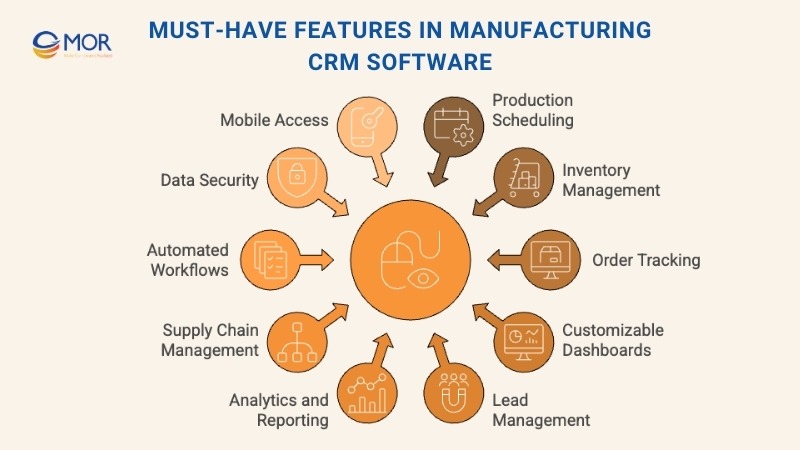
- Production Scheduling: Keeps timelines on track, ensuring smooth workflow and effective use of resources.
- Inventory Management: Monitors stock levels to prevent shortages or excess and keeps operations stable.
- Order Tracking: Gives real-time updates on order status, improving communication and customer trust.
- Customizable Dashboards: Lets teams design dashboards with the metrics and reports most relevant to their needs.
- Lead Management: Helps organize and prioritize prospects, improving sales follow-ups and conversion rates.
- Analytics and Reporting: Delivers insights into sales and operations, guiding more informed business decisions.
- Supply Chain Management: Connects supply chain processes for greater coordination and visibility at every stage.
- Automated Workflows: Cuts down on repetitive manual work, reducing errors and saving valuable time.
- Data Security: Protects customer and business information through strong encryption and secure protocols.
- Mobile Access: Enables teams to manage customer and sales data from mobile devices for added flexibility.
Costs and Pricing for Manufacturing CRM
Choosing the right manufacturing CRM means knowing how different pricing tiers work. Costs can shift depending on features, user count, and any added services. Below is a breakdown of the most common plans, their average prices, and the features typically offered.
Plan Comparison for Manufacturing CRM Software
Plan Type | Average Price | Included Features |
Free Plan | $0/user/month | Basic contact tools, limited reports, and standard email support |
Personal Plan | $5–$25/user/month | Improved contact management, entry-level analytics, and mobile access |
Business Plan | $30–$60/user/month | Advanced analytics, customizable dashboards, and workflow automation |
Enterprise Plan | $70–$150/user/month | Full customization, advanced security, and priority-level support |
Choosing The Right Manufacturing CRM
Selecting a manufacturing CRM goes beyond comparing features on paper. Manufacturers need to carefully evaluate internal challenges, technical needs, and growth objectives to find a system that fits both now and in the future. A structured, step-by-step approach ensures the platform can support daily operations while scaling with long-term expansion.
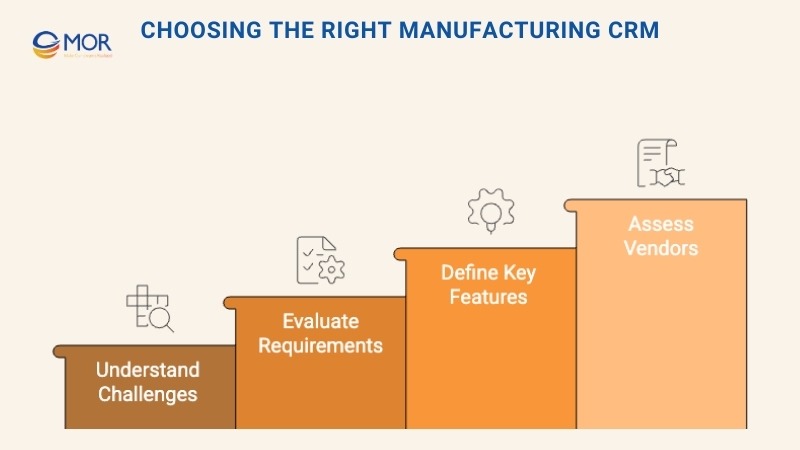
Understand Your Business Challenges and Goals
Start by identifying the real pain points in your processes, such as slow quoting, lack of distributor visibility, or gaps between sales and production. Pinpointing these issues makes it easier to prioritize the CRM features that matter most, whether it’s ERP integration, automated quoting, or better partner management. At the same time, define clear goals and evaluate systems not only for their immediate functions but also for their ability to serve as a driver of future growth.
Evaluate Technical and System Requirements
Before moving forward with a new manufacturing CRM, it’s important to define your technical needs, compliance standards, scalability expectations, and integration options. Establishing these criteria upfront gives your team a clear path to selecting the right solution:
- Security and privacy requirements: Look for core safeguards such as access controls, multifactor authentication, encryption, and secure hosting. Certifications like SOC 2 or ISO/IEC 27001 add trust that the platform meets global standards. Features such as audit trails and activity logs also strengthen oversight and simplify response if issues occur.
- Compliance requirements: For regulated industries, ensure the CRM supports frameworks like GDPR in Europe, ITAR for defense exports, or ISO 9001 for quality management. Automated reporting, document storage, and built-in audit trails can reduce the burden of proving compliance. Some platforms even track certification renewals and regulatory deadlines.
- Scalability requirements: Choose a system that grows with your business. Cloud-based options are well suited, as they handle larger user counts, complex workflows, and bigger data sets without major infrastructure changes. Support for new product lines, markets, and sales channels is key as strategies expand.
- Integration and system requirements: Compatibility with current tools reduces disruption during deployment. CRMs with strong APIs or ready-made connectors can simplify integration and maintenance. Use a checklist to compare how well each option supports your existing workflows and data needs.
- Cost requirements: Factor in more than licensing or subscription fees. Consider implementation, customization, training, and long-term support costs. Look at how pricing scales with users and features, and weigh ROI in terms of faster sales cycles, better customer retention, and productivity gains.
Define the Features That Matter Most
When considering a manufacturing CRM, start by mapping your internal workflows and examining how teams currently manage sales, service, inventory, and production schedules. Identify pain points like duplicate customer records, delayed orders, or gaps in communication, then connect these issues to the functionality needed to solve them. This creates a prioritized list of must-have features.
Pay attention to industry-focused capabilities such as inventory monitoring, order management, and integration with ERP or manufacturing execution systems. Broader tools like pipeline visibility, marketing automation, and advanced analytics also play an important role in meeting long-term goals. Clearly separate critical features from nice-to-have options, so selection stays focused on operational needs rather than flashy extras. Involving voices from multiple departments ensures the final CRM supports both daily manufacturing workflows and future business expansion.
Assess Vendors and Potential Solutions
Take time to evaluate each manufacturing CRM option in detail, looking at both functionality and usability. Pay attention to vendor reputation, onboarding support, and training resources, since these are crucial for a smooth rollout. Trial periods or live demos provide firsthand experience with the platform’s interface and features, helping teams judge ease of use.
Gather input from stakeholders across sales, marketing, service, and IT, since these groups will rely on the system daily. Review vendor case studies, customer testimonials, and independent review platforms to understand how the CRM performs in real-world manufacturing environments. This broader perspective helps confirm whether the solution is reliable and well suited for long-term use.
Start Your Manufacturing CRM Development Journey With MOR Software
Building and implementing a manufacturing CRM is a strategic step toward higher ROI and sustained growth. Introducing a tailored CRM solution, manufacturers can automate repetitive workflows, strengthen customer engagement, and gain better control over sales and operations. The result is improved customer experience, stronger loyalty, and measurable increases in revenue.
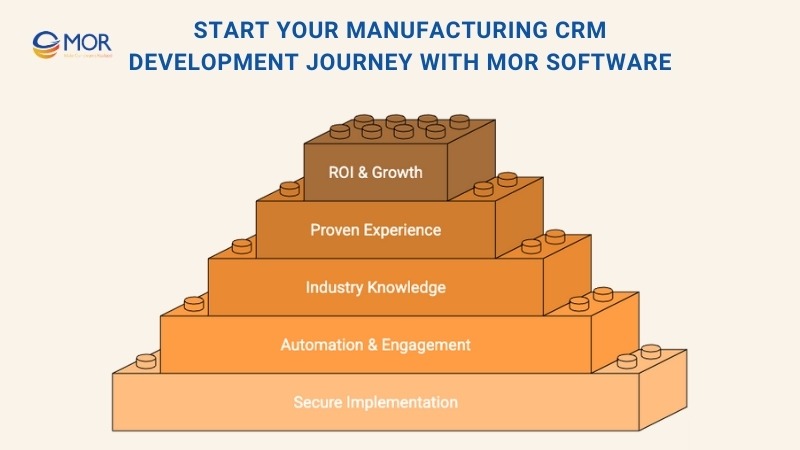
At MOR Software, we understand the unique challenges of manufacturing. With over 850 completed projects and ISO 9001:2015 and ISO 27001:2013 certifications, we bring proven expertise to every stage of CRM development. From defining clear business objectives to customizing integrations and providing post-launch support, our dedicated teams ensure a smooth and secure implementation process.
Whether your goal is to optimize sales pipelines, enhance customer service, or unlock insights with advanced analytics, we have the technical depth and industry knowledge to make it happen. Our experience spans multiple industries, with clients ranging from top banks and healthcare providers to global manufacturers, giving us the perspective to deliver solutions that truly fit.
Looking for a reliable partner to develop or implement a manufacturing CRM? Connect with MOR Software today and let’s turn your goals into results.
Conclusion
Choosing the right manufacturing CRM can transform how your business handles sales, production, and customer relationships. The best systems not only streamline workflows but also create lasting value through better service and stronger loyalty. With proven expertise and global experience, MOR Software delivers tailored CRM solutions that match your goals and scale with growth. Ready to get started? Contact us today and let’s build a system that drives measurable results.
MOR SOFTWARE
Frequently Asked Questions (FAQs)
What is CRM in manufacturing?
CRM in manufacturing refers to Customer Relationship Management software designed for manufacturers. It helps companies track customer interactions, manage sales cycles, and store order histories in one place. This allows teams to improve communication, streamline processes, and build stronger customer relationships.
What is the best CRM for the manufacturing industry?
Some of the top manufacturing CRM platforms in 2025 include:
- Nutshell
- Zoho
- Zendesk Sell
- Thryv
- Insightly
What is the main drawback of implementing a CRM system?
The biggest drawback is often internal resistance. If teams don’t commit to using the CRM, data becomes inconsistent, and customer relationships suffer. Successful CRM adoption requires company-wide support and a customer-first mindset.
What are the issues and problems in implementing CRM?
Common issues include:
- Poor user adoption
- Weak integration with existing systems
- Outdated or incomplete data
- Limited customization
- Lack of user-friendly design
Addressing these challenges early improves the chances of a successful rollout.
How can CRM improve manufacturing processes?
Manufacturing CRM systems improve processes by centralizing customer data. This supports more accurate demand forecasting, better production scheduling, and improved inventory management. With deeper customer insights, manufacturers can boost efficiency and deliver higher satisfaction.
How does manufacturing CRM software help manage customer orders?
CRM software tracks customer orders from quote to delivery. It connects order management with production schedules and provides real-time updates to both staff and customers, helping reduce delays and errors.
What role does CRM software play in forecasting for manufacturing companies?
CRM platforms analyze historical sales data and customer trends to predict future demand. This ensures production schedules align with market needs, avoiding both overproduction and shortages.
How can manufacturing CRM software help with after-sales service?
CRM systems support warranty tracking, service requests, and maintenance schedules. This ensures quick issue resolution, strengthens customer loyalty, and improves overall service quality.
What’s the difference between CRM and ERP?
CRM focuses on managing customer relationships and front-end sales activities. ERP, on the other hand, handles back-end operations like accounting, procurement, and supply chain management. Many manufacturers integrate both to cover the full customer journey and internal operations.
Do manufacturing companies use CRM?
Yes. Manufacturers rely on CRM systems to manage complex sales cycles, track distributors, improve customer visibility, and support industry-specific needs like order tracking and inventory management.
Do you need a CRM solution if you already have ERP?
Yes. ERP handles business operations, while CRM strengthens customer-facing processes. In manufacturing, long sales cycles, complex quotes, and partner management benefit greatly from a dedicated CRM alongside ERP.
Rate this article
0
over 5.0 based on 0 reviews
Your rating on this news:
Name
*Email
*Write your comment
*Send your comment
1